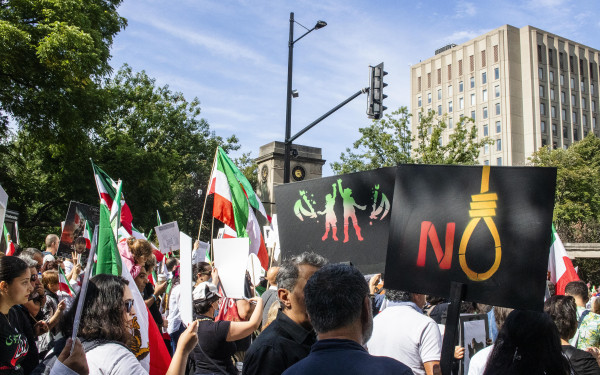Women’s Day march in Montreal calls for resistance against oppression
Montrealers took to the streets demanding justice for women and marginalized communities amid growing political unrest
Protesters braved the cold on Saturday, March 8, gathering at the George-Étienne-Cartier monument for an International Women’s Day march against imperialism, fascism and Trumpism.
The demonstration began at 1 p.m. with around a dozen participants, growing to a group of approximately 50 as the march progressed through downtown Montreal.
Chants in English, French, Spanish and Italian echoed through the streets, with slogans like "No Nazis in our neighborhoods," "Protect trans kids,” "The future is feminist" and “Fuck Trump, fuck Musk.”
Protesters carried banners condemning capitalism and political oppression, making stops for speeches along the route.
Trans activist and protest co-organizer Celeste Trianon delivered the first speech of the day, focusin on systemic injustices, particularly in the United States.
“For those living in the US [...] you have not lived in a democracy for centuries.” Trianon said. “It is time to mobilize. That begins now.”
Protesters then began marching down Parc Ave., chanting against racism, sexism, transphobia and capitalism, and playing music from portable speakers. The group turned onto Ste. Catherine St., heading west toward the US consulate.
The march reached its peak in both attendance and intensity as protesters arrived at the consulate around 2:30 p.m. There, Alice Winterland, an independent activist and protest co-organizer, delivered a speech that compared modern political repression to the rise of fascism in the early 20th century.
“First they came for the communists, and I did not speak up because I was not a communist [...] Then they came for me, and there was no one left to speak up.” Winterland quoted.
Winterland urged the crowd to recognize the erosion of human rights, particularly for women and trans people.
“Minorities losing rights should concern everyone [...] Trans people are having their rights stripped under false pretenses and fear-mongering. Women are dying on the streets due to the denial of healthcare. [...] The question is, what will you do? Will you stay silent, or will you grow a backbone and fight back?”
The march continued east before circling back toward McGill University at around 3 p.m.
“As a mother, as a woman, it is essential to be here,” said Virginie Archambault, a writer and activist. “My generation took a lot of rights for granted. Now, we see them being stripped away. People like me, like us, need to show up. Showing up matters.”
Archambault described how supporting her child, as well as her non-binary nephew and LGBTQIA2S+ family members, has shaped her activism.
“Standing up for human rights is standing up for basic human decency,” Archambault said. “Even when the crowd is small, even when it’s freezing, we are here.”
At 3:30 p.m., the march ended at the Norman Bethune statue near Guy-Concordia Metro station. Some participants dispersed, while others remained to wait for the Women from Diverse Origins’ annual International Women’s Day protest, which was set to begin at 4:30 p.m.







